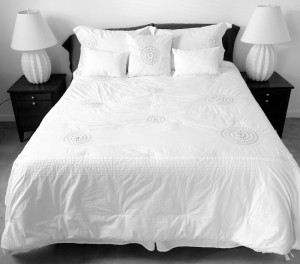Drug Detox
 Drug detox is the first part of getting clean, but it is by no means the most important part. In fact, it’s best to think of drug detox as just the first part of a treatment program that is likely to take weeks to complete, and a lifetime to maintain. The work that is done in a formal treatment program for addiction is likely to be responsible for a woman’s long-term sobriety success. Consider this: According to the Substance Abuse and Mental Health Services Administration, people who received addiction therapy within 30 days of completing detox took 40 percent longer to relapse than people who did not go through addiction therapy. Some people never even relapsed at all, after addiction therapy. So while drug detox is important to learn about, it’s best to keep its benefits in perspective, and remember that much of the hard work is still yet to come when detox is complete.
Drug detox is the first part of getting clean, but it is by no means the most important part. In fact, it’s best to think of drug detox as just the first part of a treatment program that is likely to take weeks to complete, and a lifetime to maintain. The work that is done in a formal treatment program for addiction is likely to be responsible for a woman’s long-term sobriety success. Consider this: According to the Substance Abuse and Mental Health Services Administration, people who received addiction therapy within 30 days of completing detox took 40 percent longer to relapse than people who did not go through addiction therapy. Some people never even relapsed at all, after addiction therapy. So while drug detox is important to learn about, it’s best to keep its benefits in perspective, and remember that much of the hard work is still yet to come when detox is complete.
Recovery is quite possible, but women will need to do more than simply complete detox in order to get there.
The Role of Detox
 Many women emerge from detox assuming that if the drug has left their body, they must be cured. As mentioned, however, people who go through detox are far from cured, even though they have put a large amount of work behind them in their detox programs.
Many women emerge from detox assuming that if the drug has left their body, they must be cured. As mentioned, however, people who go through detox are far from cured, even though they have put a large amount of work behind them in their detox programs.
When women enroll in detox programs, they often have traces of drugs still circulating through their bodies. In fact, through the course of the addiction, they may need those drugs in their bodies in order to feel well and normal. Over time, their bodies have become accustomed to functioning only in the presence of drugs. As soon as they stop taking drugs, they may feel terrible symptoms of withdrawal. According to an article produced by the American College of Chest Physicians, the amount of time in which those symptoms take hold and the length of time they stay in place, can vary depending on the drugs the person took and the amount of time that the person took drugs. People who take heroin, for example, might experience withdrawal symptoms within 4 to 6 hours of taking the last dose, and those symptoms might last for 7 to 10 days. Someone who took methadone, by contrast, might experience withdrawal within 24 to 48 hours, and symptoms might last for two weeks. A tailored approach is needed, based on the person’s addiction history.
The goal of detoxification programs is to help the person move through these withdrawal symptoms as quickly and as painlessly as possible.
While it’s unlikely that detoxification programs can promise people complete freedom from all pain and discomfort as they move through detox, it is possible that these programs can ease physical discomfort to some degree through medications or alternative therapies. Instead of attempting to deal with pain and discomfort alone, and perhaps lapsing back into addiction in order to make the symptoms stop, the person will have access to help, given in a safe environment in which no drugs are present, and perhaps this could lead to success that the person could simply never achieve alone.
Treatments During Detox
 Opiate medications can cause some of the most severe withdrawal symptoms available, but thankfully, there are medications that facilities can use to ease these symptoms. These opiate replacement drugs tend to work on the same receptors used by opiate drugs, but they don’t cause the same feelings of euphoria and sedation so commonly felt by people who abuse opiates. These medications must be provided at the proper time in the proper dose in order to be effective, however. This dosing can be slightly tricky.
Opiate medications can cause some of the most severe withdrawal symptoms available, but thankfully, there are medications that facilities can use to ease these symptoms. These opiate replacement drugs tend to work on the same receptors used by opiate drugs, but they don’t cause the same feelings of euphoria and sedation so commonly felt by people who abuse opiates. These medications must be provided at the proper time in the proper dose in order to be effective, however. This dosing can be slightly tricky.
Facilities sometimes use methadone to help women detox from opiates. This powerful drug has been used to treat addiction for over 40 years in the United States, according to the National Institute on Drug Abuse. The drug blocks cravings for opiates, and it can suppress symptoms of opiate withdrawal for 24 to 36 hours, making it a valuable tool in a detoxification program. It’s not the only medication available in detox programs for opiates, however. Another medication, buprenorphine, also works to block cravings, but it’s not associated with sleepiness and sedation, which many people report feeling while on methadone.
In order to provide these drugs in the right dose at the proper time, doctors monitor detoxing women closely, looking for symptoms of withdrawal, such as:
Withdrawal Symptoms
- Sweating
- Shivering
- Tearing of the eyes
- Jerking muscles
Doctors also look for signs of sedation and sleepiness. These symptoms could indicate that the dose should be moved either up or down, to help the women feel comfortable without feeling overwhelmed by side effects from the drugs.
Not every woman needs medications during drug detox. In fact, some drugs of addiction cause symptoms that prescription medications don’t yet touch. These women might benefit from supportive care, including warm blankets for chills and ice chips for hot flashes. Nausea can be treated with bland, cool food and diarrhea might best be treated with over-the-counter medications provided on a reasonable dosing schedule.
Free. Easy. Confidential.
Call Today: 1-800-469-9124
Who Answers?We have caring admissions counselors available 24/7
Caring for the Mind
 Going through detoxification can be frightening for many people. In fact, fear of detoxification is so common that medical professionals have developed a series of questions, and a scoring system, called the Detoxification Fear Survey Schedule, according to an article in the Journal of Clinical Psychology. It’s easy to understand why fear would be so common in people recovering from addiction. They are attempting to make a huge change in their lives, and they have likely experienced pain in the past when they have tried to make this change. Combining psychological concern with physical pain would likely lead to fear in almost anyone.
Going through detoxification can be frightening for many people. In fact, fear of detoxification is so common that medical professionals have developed a series of questions, and a scoring system, called the Detoxification Fear Survey Schedule, according to an article in the Journal of Clinical Psychology. It’s easy to understand why fear would be so common in people recovering from addiction. They are attempting to make a huge change in their lives, and they have likely experienced pain in the past when they have tried to make this change. Combining psychological concern with physical pain would likely lead to fear in almost anyone.
Detox programs for women attempt to soothe these fears by providing women with a safe, comfortable and trustworthy environment. Rooms are soft and inviting, instead of looking like hospital suites, and women are often encouraged to walk around the grounds and through the halls, interacting with staff and other residents. There are no temptations to use drugs in these environments, as there are no drugs available. Some women find it comforting to know that they are living in spaces in which their addiction simply will not be allowed to recur. There is no reasonable way to get drugs.
Some detox programs also provide secondary treatments that are based on Eastern medicine. In fact, according to a study published in the journal Psychology of Addictive Behaviors, about 50 percent of facilities that responded to a survey request reported that alternative treatments were considered acceptable. This seems to indicate that treatments once considered unusual or experimental are moving to becoming normal in addiction care. It’s easy to see why. These treatments may help women to overcome the physical discomfort they are feeling, without relying on prescription medications.
Treatments may vary, but common options include:
- Massage
- Acupuncture
- Art therapy
- Tai chi
It might seem as though these treatments are frivolous, meant to simply help people spend their time in a comfortable hobby, but the truth is that many of these treatments have their roots firmly in scientific principles. The study results are somewhat hard to understand, however, as many studies on alternative therapies tend to be small, and the results might be skewed as a result. Much more work needs to be done before these treatments can be considered part of science-based care.
Obtaining Care
 The truth about addiction is that it is a disease, and that means its symptoms persist whether drugs and alcohol are present or not. In order to address root causes instead of just symptoms, it’s essential to get at the underlying dynamics and understand the way addiction actually operates in the mind and soul. For work such as this, most experts recommend getting into residential drug treatment that takes a scientific and spiritual accounting of the addict herself. This work takes place in a drug treatment program, which typically takes over where a detoxification program leaves off. In order to help ensure that women make the transition from detox to rehab, many facilities provide women with coaching sessions near the end of detox. In these sessions, therapists attempt to help women understand why their journey to recovery has just begun, and what else they’ll need to do in order to make the process move forward. Some therapists use a technique known as motivational interviewing in which they ask the women to discuss their lives and their goals, and then explain how being addicted helps them reach their goals. For many women, these talks serve as wakeup calls that addiction really can destroy their lives. At the end of these sessions, they may be more willing to accept the help a rehab program can provide.
The truth about addiction is that it is a disease, and that means its symptoms persist whether drugs and alcohol are present or not. In order to address root causes instead of just symptoms, it’s essential to get at the underlying dynamics and understand the way addiction actually operates in the mind and soul. For work such as this, most experts recommend getting into residential drug treatment that takes a scientific and spiritual accounting of the addict herself. This work takes place in a drug treatment program, which typically takes over where a detoxification program leaves off. In order to help ensure that women make the transition from detox to rehab, many facilities provide women with coaching sessions near the end of detox. In these sessions, therapists attempt to help women understand why their journey to recovery has just begun, and what else they’ll need to do in order to make the process move forward. Some therapists use a technique known as motivational interviewing in which they ask the women to discuss their lives and their goals, and then explain how being addicted helps them reach their goals. For many women, these talks serve as wakeup calls that addiction really can destroy their lives. At the end of these sessions, they may be more willing to accept the help a rehab program can provide.
In a study of the effectiveness of motivational interviewing on women, published in the Annual Review of Clinical Psychology, researchers found that motivational interviewing was most effective when it wasn’t provided via a manual. When the women were given the opportunity to really talk, instead of being asked to read a book and think about it, the results were much more striking. This is a good study to keep in mind when women are looking for addiction treatment programs to help them. Those that allow for the unique communication styles of women, those based on talking and sharing, tend to be more effective than those that provide a didactic, lecturing approach.
Some detox facilities provide rehab care on the same grounds, and they simply transition women from one wing of the facility to another.
This might be the most seamless way to provide care, as women don’t have the opportunity to drop out of their care and return home before their work is complete. Other programs ask women to transition from one facility to another, and they may ask a counselor to make that transition, too, just to ensure that it has been completed. As long as the woman makes the move to the other form of care, this approach can be effective.
Care at The Orchid
 If you’re a woman struggling with an addiction to drugs, The Orchid may be precisely what you need. Ours is a program built on the uncommon power of women to forge lasting bonds that promote healing, and to this end, we devote the lion’s share of our time to relational therapies. Whether you prefer narrative storytelling or reciprocal group guidance, you have probably never experienced anything quite as affirming and effective as the communities of trust we offer.
If you’re a woman struggling with an addiction to drugs, The Orchid may be precisely what you need. Ours is a program built on the uncommon power of women to forge lasting bonds that promote healing, and to this end, we devote the lion’s share of our time to relational therapies. Whether you prefer narrative storytelling or reciprocal group guidance, you have probably never experienced anything quite as affirming and effective as the communities of trust we offer.
The Orchid includes a wide variety of collateral therapies throughout your stay, including seaside counseling and art therapy to foster a woman’s health and well-being. If you have been seeking a holistic, progressive approach that caters especially to the needs of women, we urge you to get in touch with us today at 1-888-672-4435.
Further Reading